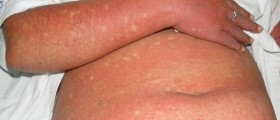
Malaria is potentially serious infectious disease spread by mosquitoes. This infection is caused by eukaryotic protists of the genus Plasmodium and prevalent in the hot tropical and subtropical regions with significant amounts of rain and constant hot temperatures. A lot of humidity, moisture and warmth provide mosquitoes everything they need to continue reproducing continuously.
Malaria statistics
In 2008, an estimated 190 - 311 million cases of malaria occurred worldwide. Of these patients, most of them were children in sub-Saharan African region. About 708,000 to 1,003,000 people died from the complications related to infection. About 1,500 cases of malaria are diagnosed each year in the United States, even though malaria has been eradicated in this country since 1950's. Here, the disease usually affects travelers or immigrants, people returning from the countries from sub-Saharan Africa and South Asia.
Causes of malaria
Malaria is caused by various parasites from the genus Plasmodium. In humans, it is typically caused by P. falciparum, but some other parasites, such as P. malariae, P. ovale, P. vivax and P. knowlesi, are also known to cause malaria. Female mosquitoes of the Anopheles genus are usual transmission vectors. A mosquito becomes infected when it bites an infected human, and the infection is therefore spread through the mosquito’s body to a new human cost. In extremely rare cases, malaria parasites can be transmitted by blood transfusions.
Signs and symptoms
Infection with malaria parasites may manifest in a wide variety of symptoms. Sometimes, the symptoms are very mild but they can also be extremely severe and result in death.
Some of the Plasmodium species have incubation period of 30 years, but symptoms often occur anytime from 7 to 30 days after the infective bite. At this stage symptoms of malaria include high fever, joint pain, shivering, vomiting, anemia, kidney damage, convulsions and hemoglobin in urine. Typically, the disease begins with a feeling of sudden coldness accompanied with chills. In a couple of hours, patient will develop high fever and may begin to sweat for about four to six hours. These episodes usually occur every two to three days. In more severe cases, malaria can cause cognitive impairments, increase intracranial pressure, and enlarged spleen.
Treatment
If it is diagnosed on time and treated correctly, malaria is a manageable disease and only in some very rare cases it may progress to chronic disease and recur for the rest of the patient’s life. Recurrent malaria typically happens when parasites remain latent in the liver for many years, only to re-emerge at some stage.

















Your thoughts on this
Loading...